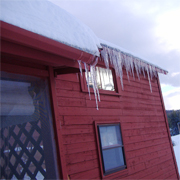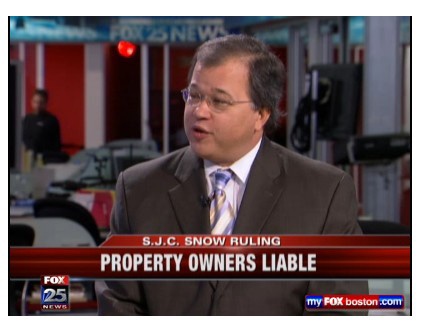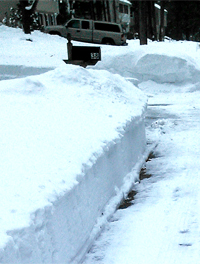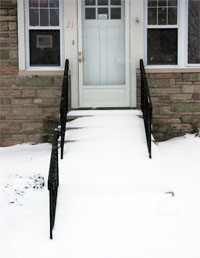Snow and Ice Accidents
Heaving Snow Posing Risk for Homeowners and Roofs
 A young woman’s death after heavy snow caused a roof collapse in Weymouth has officials warning the public to watch out for their homes.
A young woman’s death after heavy snow caused a roof collapse in Weymouth has officials warning the public to watch out for their homes.
On Thursday, a 29-year-old woman was killed when a carport collapsed on her. The woman was talking on the phone while sitting on the porch steps of a Harlem Road home. The Massachusetts Emergency Management Agency (MEMA) has issued a warning for the public to clear off their home roofs and storm drains in their neighborhoods to minimize flooding problems.
While we expect snow in Massachusetts, it has challenged drivers and caused numerous school day cancellations this season. Piles of snow have hampered visibility. Drivers are navigating a maze of snow-packed and slushy roads along with dangerous potholes and, which are starting to appear in the melting.
In addition to the Weymouth woman’s death, a barn collapse in Framingham killed three cows and injured four others this week. At the Burlington Mall, a water main break trapped a vehicle in a large sinkhole. The mall was closed but expected to re-open today.
It may seem like a record-setting season, but not this year. Yes, we are already 25 inches above the average season’s snowfall. But earlier this week (before the snowfall) the Boston Herald reported that while Boston had seen 53.5 inches, 1995-1996 was the record snow year, with 107.6 inches. The National Weather Service has predicted this season will not even make the top 10 list for heaviest snowfalls.
When snow piles up, some roofs are vulnerable to collapse, especially when there are numerous snow storms combined with rain and overnight melting. Flat commercial roofs are at the greatest risk. This year, while the snow may not appear that deep, some of the storms have dumped heavy wet snow, and that has been followed by soaking rains. The loads are immense.
How to remove snow from a roof is a challenge. Homeowners can attempt to clear it themselves with a snow rake, which can be purchased at most hardware stores. But you should never use a snow rake from a roof. You should clear the snow from the ground to avoid the risk of slipping and falling and head injuries.
Unless you are experienced, avoid ladders, which can be extremely slippery. The other thing to know is that metal snow rakes can conduct electricity if they come into contact with a power line.
Often by this time of year, a roof may require a professional treatment because of repeated snow storms and winter freezing. If that is the case, call someone who is experienced and insured for this type of work. They should be insured in case they damage your home, and they should also carry worker’s compensation insurance for their employees. You have the right to ask for proof of insurance, and you should.
Finally, do take some time to shovel your walks and your stairs. It the safe and the neighborly thing to do.
Read More
Massachusetts Property Owners Have a Legal Responsibility to Clear Snow and Ice
If you are a property owner, today is a good time to inspect your driveway and walkways. Even if you worked hard to clear all the snow yesterday, go out and take a second look. The deep freeze is setting in and more snow is forecast for tomorrow, creating the potential for slip and fall accidents.
Why is this important? In addition to making it easier for your family to come and go from your home, you have a duty to use reasonable care to clear snow and ice under Massachusetts law. If you neglect this, you could be liable for any injuries that result.

Massachusetts Law on Snow and Ice Removal The law for clearing your property is more strict than in past years. It changed in 2010, with the Massachusetts Supreme Judicial Court’s decision in Papadopoulos v. Target Corporation, SJC-10529 (July 26, 2010). View TV interviews from 2010/2011 in which attorney David White explains the law.
Prior to then, property owners were liable for injuries sustained on what was known as “unnatural accumulations” of snow or ice. Examples of this are gutters leaking onto sidewalks or snow piled on sidewalks.
The state’s high court changed the longstanding law so it falls in line with other states. Massachusetts property owners now have a responsibility to keep their premises in a reasonably safe condition and clear all snow and ice, whether it is a natural accumulation by Mother Nature or pushed there by a plow.
This law applies to homeowners as well as commercial property owners.
A few points to remember when it snows:
- You have a responsibility to clear your driveway, sidewalks and other areas accessible to the public.
- If you are using a snow blower, remember a shovel for narrow and hard-to-reach areas.
- Do you have the physical ability and time to clear your snow this year? If not, consider contacting a snow removal company.
- Cities have responsibility for clearing sidewalks, but some have ordinances requiring residents to clear their own. These include Boston, Worcester and Newton.
Safety
We all have to balance our legal responsibility to clear the snow with safety. It is hard work and tempting to take shortcuts at times. Remember a few basic safety rules. Do not start your snow blower in your garage or other covered areas. Before you shovel your driveway, clear your home’s heating vents so carbon monoxide does not build up in your home. Then, make sure you dress in layers and take breaks as needed.
Related:
Snow removal law may face test, Boston Globe, Dec. 25, 2010.
Read More
Travel Safe in Boston After Blizzard of 2013
 After a snow storm that buried Massachusetts with record-setting strength, many of us are slowly making our way back to our daily routines.
After a snow storm that buried Massachusetts with record-setting strength, many of us are slowly making our way back to our daily routines.
Massive snow banks, narrow roads and giant icicles are now the challenge. Governor Deval Patrick has lifted the weekend’s driving ban, but the State of Emergency remained in effect this morning. Many schools cancelled classes for another day and Boston Mayor Tom Menino encouraged businesses to let their employees work from home today.
Our tips for staying safe and avoiding injuries as you travel:
Community Websites. Check your community website for information about snow plowing and closed streets, as well as power outages and school closures.
Public Transportation. Use the MBTA if you are traveling into Boston. Mayor Menino is urging the public to stay off the roads to make room for cleanup.
Store and Pharmacy. Choose merchants close to home if you are heading out to restock up on food, medications and other supplies. Travel in daylight if possible.
Pedestrians Use Caution. Stay indoors today. Over the next few weeks, limit outdoor walks until the snow melts. If you must walk, wear a neon-colored vest.
Drivers. If you do drive, beware of the tall snowbanks and avoid roads which may not be fully cleared. Remember some roads may not have enough space for two-lane traffic.
Parking. Call ahead to ask about parking, even to your employer. Parking may not be available or be limited. Looking for spaces can lead to frustration among drivers and car accidents.
Gasoline and Vehicle Supplies. Keep your gas tank full over the next few days and equip your car with supplies such as a first aid kit, snow brush, small shovel, blanket and an extra hat and pair of mittens.
Take a Minute. Driving in these conditions can be stressful and accidents can occur. If you find yourself in a dangerous situation, pull over at your earliest opportunity. Take a minute to think about your options and if necessary, call the local police or fire department on their non-emergency line and ask for their direction.
Related:
Massachusetts Emergency Management Agency App.
Massachusetts Snow Storm Safety Tips
 In a few hours, a historic snowstorm is forecast to begin, blanketing Boston with 18 inches in many areas and 24 to 32 inches in some regions. Gov. Deval Patrick has urged the public to stay home, and directed non-essential state employees not to report to work. Many schools and offices have closed in response. The MBTA will close at 3:30 this afternoon and may remain shut down through the weekend.
In a few hours, a historic snowstorm is forecast to begin, blanketing Boston with 18 inches in many areas and 24 to 32 inches in some regions. Gov. Deval Patrick has urged the public to stay home, and directed non-essential state employees not to report to work. Many schools and offices have closed in response. The MBTA will close at 3:30 this afternoon and may remain shut down through the weekend.
With a few more hours, here are some tips to prepare yourself:
Have a Plan to Stay in Contact. Whether you live at home with your family or in an apartment on your own, have a plan to communicate with your relatives, landlord and others. Gather phone numbers for snow plow companies, neighbors and local police and fire departments.
Check Your Community Website. Your city or town should post emergency information for residents to follow during the storm, including plans for clearing snow, snow storm accidents and emergency notifications.
Keep in Touch Electronically. Charge your cell phone now and monitor news on TV and the Internet. Another source of information is to dial 2-1-1, the state’s telephone information call center during times of emergency. You can also sign up for electronic alerts from the state on your phone by clicking here.
Social Media. If you are on Facebook, you can follow MEMA, the Massachusetts Emergency Management Agency by visiting its page. If you use Twitter, the hashtag for storm updates is #MAStorm.
Gas Up. The lines at the pump may be long, but if you can, fill your car with gasoline. This will give you a way to charge your cell phone if your home loses power.
Food and Supplies. Make sure you have enough food and supplies to pass the weekend, including bottled water and flashlights. Also make sure you have any medications you may need.
Power Loss. We may lose power so set your appliances and gather supplies accordingly. Set your refrigerator to the coldest setting and have a cooler ready, so you can keep it shut as much as possible during the storm. Food can stay cold in a full refrigerator for up to 24 hours and in a full-packed freezer for 48 hours. Have non-perishable food on hand as well, such as granola bars.
Turn Off TVs and Other Appliances. If we lose power, unplug sensitive electronic equipment such as TVs, microwave ovens and computers. These can cause irregularities when power is restored. Leave a light on so you know power is restored.
Plan for a Heating Loss. Gather blankets and seal off unused rooms by stuffing towels in the space under the doors. At night, cover windows with extra blankets and sheets. Make sure you regularly eat.
Freezing Pipes. If pipes freeze, remove insulation, turn on all faucets and pour hot water over the pipes. With caution, you can also use a hand-held hair dryer on the pipes.
Clearing Snow. Keep up with clearing snow as much as you can in the early hours of the storm and after the storm, follow directions from state and local officials for clearing it from areas such as sidewalks.
Clear Snow from Furnace Pipe. Throughout the storm, make sure your furnace exhaust vents remains clear of snow to avoid a build-up of carbon monoxide in your home. This is essential even when you cannot clear your driveway and other areas because it could result in poisoning.
Related:
Winter Power Outage Safety Tips, Massachusetts Emergency Management Agency.
Read More
Snow and Ice Accident Appeal Leads to New Trial in Massachusetts Superior Court
An appeal by a plaintiff in a Massachusetts snow and ice slip-and-fall case has led to the opportunity for trial. The Massachusetts Appeals Court vacated the original judgment and remanded the case for further proceedings after finding that the judge erred in allowing the defendant’s motion for summary judgment.
The case arose from a fall that occurred outside a McDonald’s restaurant in 2007. The plaintiff, Mercilia Lindor, slipped and fell on an icy sidewalk outside the restaurant, breaking her foot. While still lying on the sidewalk, Lindor witnessed another man close by slip and fall to his knees. The conditions were so bad that emergency personnel at the scene had difficulty moving the plaintiff. They had to ask McDonald’s employees to salt the area.
Prior to trial, McDonald’s moved for a summary judgment, arguing that the ice outside the restaurant had accumulated naturally, and that under long-standing Massachusetts common law it was not liable for an accident occurring under those conditions. The plaintiff filed no opposition, and the judge allowed the defendant’s motion, issuing the order on July 22, 2010.
The resulting judgment was entered on the docket on July 28, 2010.
Two days prior to this, however, on July 26, 2010, the Massachusetts Supreme Judicial Court decided the case of Papadopoulos v. Target Corp., in which it established a new standard for determining liability in cases of injury arising from ice and snow accidents: property owners must take “reasonable care” to remove all accumulations of ice and snow. This new standard does not require any distinction between “natural” and “unnatural” accumulations.
The Court also held that the ruling was retroactive, meaning it will be applied to all open and pending claims in which a judgment had not yet been entered. Although the judge issued an order for summary judgment prior to the Papadopoulos ruling, in Massachusetts a judgment is only considered final when a clerk dockets it. Fortunately for the plaintiff, this occurred on July 28, two days after the ruling in Papadopoulos. For this reason, the “reasonable care” standard established in Papadopoulos will apply to Lindor’s case.
The Court decided that there was a genuine issue of fact as to whether McDonald’s took “reasonable care” in protecting lawful visitors to the property, and as a result, the judgment was vacated, enabling Ms. Lindor to pursue her claim.
The case decided was Lindor v. McDonald’s Restaurants of Massachusetts, Inc., Mass. App. Ct No. 10-P-1615 (November 10, 2011).
Read More

